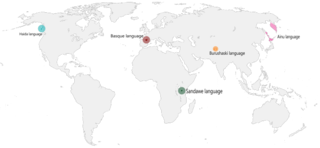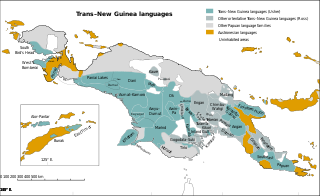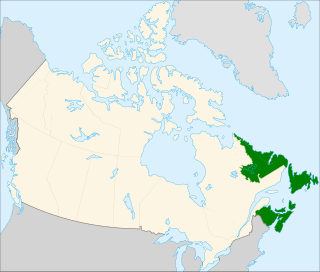The Isolator may refer to
The Isolator may refer to

A language family is a group of languages related through descent from a common ancestral language or parental language, called the proto-language of that family. The term "family" reflects the tree model of language origination in historical linguistics, which makes use of a metaphor comparing languages to people in a biological family tree, or in a subsequent modification, to species in a phylogenetic tree of evolutionary taxonomy. Linguists therefore describe the daughter languages within a language family as being genetically related. The divergence of a proto-language into daughter languages typically occurs through geographical separation, with different regional dialects of the proto-language spoken by different speech communities undergoing different language changes and thus becoming distinct languages from each other.
Buffer may refer to:

Asia is home to hundreds of languages comprising several families and some unrelated isolates. The most spoken language families on the continent include Austroasiatic, Austronesian, Japonic, Dravidian, Indo-European, Afroasiatic, Turkic, Sino-Tibetan and Kra–Dai. Many languages of Asia, such as Kurdish, Sanskrit, Arabic or Tamil, have a long history as a written language.

A language isolate is a language that has no demonstrable genetic relationship with another language. Basque in Europe, Ainu in Asia, Sandawe in Africa, Haida and Zuni in North America, Kanoê in South America, and Tiwi in Australia are all examples of language isolates. The exact number of language isolates is yet unknown due to insufficient data on several languages.

Trans–New Guinea (TNG) is an extensive family of Papuan languages spoken on the island of New Guinea and neighboring islands, a region corresponding to the country Papua New Guinea as well as parts of Indonesia.
Isolation is the near or complete lack of social contact by an individual.

Laal is an endangered language isolate spoken by 749 people in three villages in the Moyen-Chari prefecture of Chad on opposite banks of the Chari River, called Gori (lá), Damtar (ɓual), and Mailao. It represents an isolated survival of an earlier language group of Central Africa. It is unwritten except in transcription by linguists. According to former Summer Institute of Linguistics-Chad member David Faris, it is in danger of extinction, with most people under 25 shifting to the locally more widespread Bagirmi.
Shabo is an endangered language and likely language isolate spoken by about 400 former hunter-gatherers in southwestern Ethiopia, in the eastern part of the South West Ethiopia Peoples' Region.
Isolate may refer to:
Vibration isolation is the prevention of transmission of vibration from one component of a system to others parts of the same system, as in buildings or mechanical systems. Vibration is undesirable in many domains, primarily engineered systems and habitable spaces, and methods have been developed to prevent the transfer of vibration to such systems. Vibrations propagate via mechanical waves and certain mechanical linkages conduct vibrations more efficiently than others. Passive vibration isolation makes use of materials and mechanical linkages that absorb and damp these mechanical waves. Active vibration isolation involves sensors and actuators that produce disruptive interference that cancels-out incoming vibration.
Isolator may refer to:

Kusunda or कुसान्डा is a language isolate spoken by a few among the Kusunda people in western and central Nepal. As of 2023, it only has a single fluent speaker, Kamala Khatri Sen, although there are efforts underway to keep the language alive.
Insulator may refer to:
Saparo–Yawan is a language family proposal uniting two small language families of the western Amazon. It was first proposed by Swadesh (1954), and continues through Payne (1984) and Kaufman (1994).
Siberian languages may refer to any languages spoken in Siberia, including:
Bushing may refer to:
Dart is a programming language designed by Lars Bak and Kasper Lund and developed by Google. It can be used to develop web and mobile apps as well as server and desktop applications.
Glottolog is a free online bibliographic database of the world's languages. In addition to listing linguistic materials describing individual languages, the database also contains the most up-to-date language affiliations based on the work of expert linguists.

The Atlantic Bubble was a special travel-restricted area created on July 3, 2020, during the COVID-19 pandemic in Canada. The area was an agreement between the four Atlantic Canadian provinces of New Brunswick, Prince Edward Island, Nova Scotia, and Newfoundland and Labrador which allowed unrestricted travel among provincial residents and restricts travel from Canadians who are residents of outside provinces. Residents wishing to travel to the Atlantic Bubble are subjected to screening and are required to quarantine for 14 days before moving freely throughout the bubble. Individual provinces have specific rules toward travellers from outside of Atlantic Canada. The provinces in the bubble have seen the lowest numbers of COVID-19 compared to other Canadian provinces throughout the pandemic.

This article documents the chronology of the response to the COVID-19 pandemic in February 2022, which originated in Wuhan, China in December 2019. Some developments may become known or fully understood only in retrospect. Reporting on this pandemic began in December 2019.